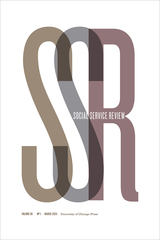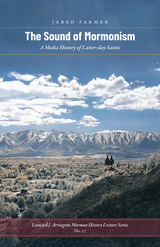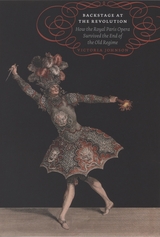
Sifting through royal edicts, private letters, and Revolutionary records of all kinds, Johnson uncovers the roots of the Opera’s survival in its identity as a uniquely privileged icon of French culture—an identity established by the conditions of its founding one hundred years earlier under Louis XIV. Johnson’s rich cultural history moves between both epochs, taking readers backstage to see how a motley crew of singers, dancers, royal ministers, poet entrepreneurs, shady managers, and the king of France all played a part in the creation and preservation of one of the world’s most fabled cultural institutions.
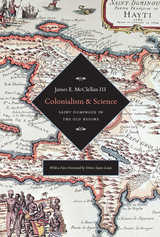
How was the character of science shaped by the colonial experience? In turn, how might we make sense of how science contributed to colonialism? Saint Domingue (now Haiti) was the world’s richest colony in the eighteenth century and home to an active society of science—one of only three in the world, at that time. In this deeply researched and pathbreaking study of the colony, James E. McClellan III first raised his incisive questions about the relationship between science and society that historians of the colonial experience are still grappling with today. Long considered rare, the book is now back in print in an English-language edition, accompanied by a new foreword by Vertus Saint-Louis, a native of Haiti and a widely-acknowledged expert on colonialism. Frequently cited as the crucial starting point in understanding the Haitian revolution, Colonialism and Science will be welcomed by students and scholars alike.
“By deftly weaving together imperialism and science in the story of French colonialism, [McClellan] . . . brings to light the history of an almost forgotten colony.”—Journal of Modern History
“McClellan has produced an impressive case study offering excellent surveys of Saint Domingue’s colonial history and its history of science.”—Isis
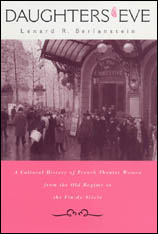
Famous and seductive, female stage performers haunted French public life in the century before and after the Revolution. This pathbreaking study delineates the distinctive place of actresses, dancers, and singers within the French erotic and political imaginations. From the moment they became an unofficial caste of mistresses to France's elite during the reign of Louis XIV, their image fluctuated between emasculating men and delighting them.
Drawing upon newspaper accounts, society columns, theater criticism, government reports, autobiographies, public rituals, and a huge corpus of fiction, Lenard Berlanstein argues that the public image of actresses was shaped by the political climate and ruling ideology; thus they were deified in one era and damned in the next. Tolerated when civil society functioned and demonized when it faltered, they finally passed from notoriety to celebrity with the stabilization of parliamentary life after 1880. Only then could female fans admire them openly, and could the state officially recognize their contributions to national life.
Daughters of Eve is a provocative look at how a culture creates social perceptions and reshuffles collective identities in response to political change.
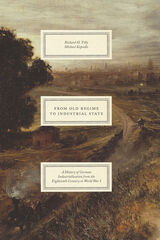
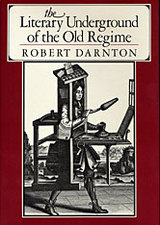
“This is splendid historical writing…Darnton [has] a well-justified reputation as one of the most original contributors to our understanding of life in pre-revolutionary Paris.” —New York Review of Books
Robert Darnton introduces us to the shadowy world of pirate publishers, garret scribblers, under-the-cloak book peddlers, smugglers, and police spies that composed the literary underground of the Enlightenment.
Here are the ambitious writers who crowded into Paris seeking fame and fortune within the Republic of Letters, but who instead sank into the miserable world of Grub Street—victims of a closed world of protection and privilege. Venting their frustrations in an illicit literature of vitriolic pamphlets, libelles, and chroniques scandaleuses, these “Rousseaus of the gutter” desecrated everything sacred in the social order of the Old Regime. Here too are the workers who printed their writings and the clandestine booksellers who distributed them.
While censorship, a monopolistic guild, and the police contained the visible publishing industry within the limits of official orthodoxies, a prolific literary underworld disseminated a vast illegal literature that conveyed a seditious ideology to readers everywhere in France. Covering their traces in order to survive, the creators of this eighteenth-century counterculture have virtually disappeared from history. By drawing on an ingenious selection of previously hidden sources, such as police ledgers and publishers’ records, Robert Darnton reveals for the first time the fascinating story of that forgotten underworld.
The activities of the underground bear on a broad range of issues in history and literature, and they directly concern the problem of uncovering the ideological origins of the French Revolution. This engaging book illuminates those issues and provides a fresh view of publishing history that will inform and delight the general reader.


With his monumental work The Old Regime and the Revolution, Alexis de Tocqueville (1805–59)—best known for his classic Democracy in America—envisioned a multivolume philosophical study of the origins of modern France that would examine the implications of French history on the nature and development of democratic society. Volume I, which covered the eighteenth-century background to the Revolution, was published to great acclaim in 1856. On the continuation of this project, he wrote: "When this Revolution has finished its work, [this volume] will show what that work really was, and what the new society which has come from that violent labor is, what the Revolution has taken away and what it has preserved from that old regime against which it was directed."

Russian Orthodoxy under the Old Regime was first published in 1978. Minnesota Archive Editions uses digital technology to make long-unavailable books once again accessible, and are published unaltered from the original University of Minnesota Press editions.
In this book, which is especially suitable for course use, eleven scholars examine one of the most important institutions of imperial Russia, the Orthodox church in the two centuries before the Russian revolution. The material is arranged in two sections, the first devoted to Orthodoxy's role in Russian social and cultural life and the second dealing with the church's relationship to the tsarist regime.
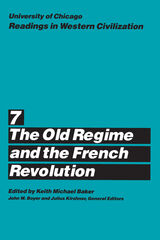
Individual volumes provide essential background reading for courses covering specific eras and periods. The complete nine-volume series is ideal for general courses in history and Western civilization sequences.
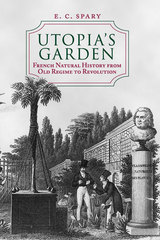
E. C. Spary traces the scientific, administrative, and political strategies that enabled the foundation of the Muséum, arguing that agriculture and animal breeding rank alongside classification and collections in explaining why natural history was important for French rulers. But the Muséum's success was also a consequence of its employees' Revolutionary rhetoric: by displaying the natural order, they suggested, the institution could assist in fashioning a self-educating, self-policing Republican people. Natural history was presented as an indispensable source of national prosperity and individual virtue.
Spary's fascinating account opens a new chapter in the history of France, science, and the Enlightenment.
READERS
Browse our collection.
PUBLISHERS
See BiblioVault's publisher services.
STUDENT SERVICES
Files for college accessibility offices.
UChicago Accessibility Resources
home | accessibility | search | about | contact us
BiblioVault ® 2001 - 2025
The University of Chicago Press


